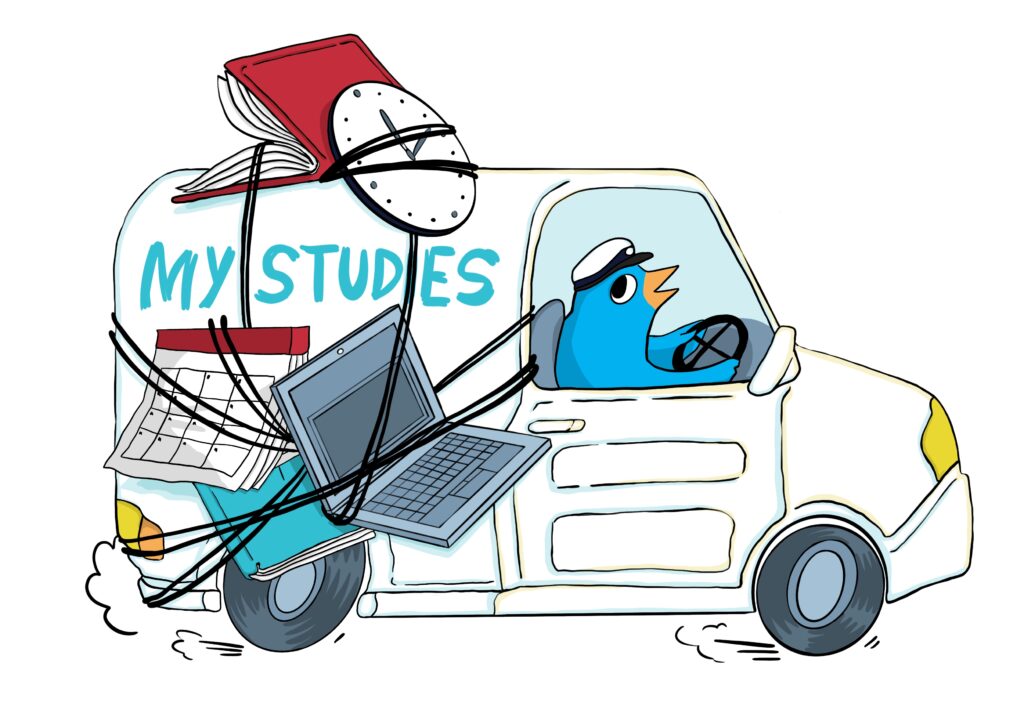- Career Hub
- Future Skills
- Academic planning
- Planning further studies
- Planning your studies
- How to manage your studies?
- How to plan for your studies?
- How much freedom do you have to modify your studies?
- When to make learning choices within the curriculum?
- How little or how much can you study?
- How can you concentrate on and manage the time of studies?
- How to change specialisations?
- How to study well?
- Internship
- International experience
- Work-life development
- Act and grow
How can you concentrate on and manage the time of studies?

In addition to making plans for your studies, you will also have to organise the practical and financial side of your life during university, such as deciding where to live and how to buy food, clothes and study materials. To do this, you need to think about your income and whether it will cover the necessary expenses. Some students try to find a job to make ends meet, while others take student loans. You can also apply for a stipend and allowance. It is also possible to facilitate your studies in other ways, such as going on academic leave, extending your studies, paying the tuition fee, applying for recognition of prior learning and experience (RPL), etc. If you have special needs, the university will take this into account. Even if you have not completed your studies, you can continue them under certain conditions.
Academic leave releases the student from the obligation of undertaking study and research, but they will remain on the list of students. It is a good option for those who need to take a break from their studies, manage their workload or fulfil the university’s requirements regarding study regulations. You can apply for academic leave at your own request or for health reasons.
There are also options for taking academic leave upon commencement of service in the Defence Forces or to care for a child.
Further information about academic leave is on the UT website.
Yes, it is. For example, studies are extended by time spent on academic leave and studying abroad. Please note that in the case of academic leave, the extended period is counted in days, and in the case of studying abroad, in semesters. In addition, it is possible to apply for an extension of your studies (postponement of the final date of the study period) in order to eliminate academic lagging.
Most Estonian-taught curricula and some English-taught curricula are free of charge for full-time study. A student admitted free of charge must accumulate the required number of credits per semester. Failure to do so will result in a tuition fee.
Many foreign-language curricula and part-time study are fee-paying. The amount of the tuition fee depends on the place and programme of study. Full information on tuition fees can be found on the UT website.
Recognition of prior learning and experience allows degree studies, continuing education and work experience already acquired at higher education and training institutions into account for study purposes if these are in accordance with admission requirements and the particular curriculum. The application is evaluated by the faculty’s RPL committee.
If you need advice regarding RPL, contact your programme’s RPL adviser. For general questions you can also send an email at vota@ut.ee.
A student with special needs is a student who needs support to achieve learning outcomes. This can be done through changes in the organisation of the course or in the learning environment.
The special need may be health-related: the student may have a long-standing medical condition, a mental or physical disability. For example, exceptional talent, an active sporting career or the burden of taking care of a family member, as well as a political or military situation may also require greater flexibility in the context of education.
Read more about possible adaptations and contact the special needs adviser to discuss the kind of adaptations necessary to be made for you in admission, attendance, taking exams and assessments, purchasing study materials or in creating a suitable social and physical environment.
If your studies at the University of Tartu have been interrupted for some reason, but you wish to continue them, it is possible to apply for rematriculation to be reincluded in the student register or to continue your studies as an external learner (in Estonian).
You can also continue your studies in another curriculum. In this case, you can apply for a free student place (in Estonian) in the desired curriculum or be readmitted to the university. When re-entering the university for the second time or more, you will have to take into account the restrictions on studying tuition-free.
Yes, it is possible to study as an external student at the University of Tartu on the basis of a specific curriculum. The external student is not a student, but is allowed to complete the curriculum, take exams and assessments (up to 30 ECTS per academic year), do traineeships and write a thesis or final exam.
The University of Tartu is the largest provider of continuing education in Estonia, offering a wide range of opportunities, including open enrolment courses for self-development, specialised or professional competence enhancement for all interested parties; state-commissioned education; summer and winter university courses; e-courses, including open access e-courses (MOOCs); microcredential programmes; individual degree courses; lecture and seminar series, etc. across Estonia.
